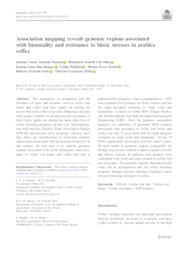Association mapping reveals genomic regions associated with bienniality and resistance to biotic stresses in arabica coffee.
Association mapping reveals genomic regions associated with bienniality and resistance to biotic stresses in arabica coffee.
Autoria: NONATO, J. V. A.; CARVALHO, H. F.; BORGES, K. L. R.; PADILHA, L.; MALUF, M. P.; FRITSCHE NETO, R.; GUERREIRO FILHO, O.
Resumo: The bienniality of production and the incidence of pests and diseases, such as coffee leaf miner and coffee leaf rust, stands out among the factors that limit coffee crop yield. Obtaining cultivars with greater stability in production and resistance to these biotic agents are among the main objectives of coffee breeding programs. In this way, biotechnological tools such as Genomic Wide Association Studies (GWAS) can increase these programs' efficacy since they allow the identification of molecular markers significantly associated with phenotypes of interest. In this context, the aim here is to identify genomic regions associated with yield, bienniality, and resistance to coffee leaf miner and coffee leaf rust in arabica coffee progenies. Thus, a population (n=597) was evaluated for resistance to biotic stresses and for the eight designed scenarios to study yield and bienniality. A matrix of 4,666 SNPs (Single Nucleotide Polymorphism) was built through Genotyping by Sequencing (GBS). After the genomic association analyses, we identified 12 potential SNPs markers associated with resistance to coffee leaf miner and coffee leaf rust, 32 associated with the eight designed scenarios to study yield and bienniality. Of the 44 SNPs significantly associated with this study's traits, 36 were noted in genomic regions responsible for biological processes related to plant response to biotic and abiotic stresses. In addition, four markers were coincident with yield and traits related to coffee leaf rust resistance. The genomic regions identified in this study can be incorporated into the coffee breeding program, through assisted selection, leading to more efficient breeding strategies in coffee.
Ano de publicação: 2021
Tipo de publicação: Artigo de periódico
Unidade: Embrapa Café
Palavras-chave: Biotic stress, Coffea Arábica, Coffea arabica var. arabica, Genetic resistance, Genoma, Mapa, Stress, Yield mapping
Observações
1 - Por padrão são exibidas publicações dos últimos 20 anos. Para encontrar publicações mais antigas, configure o filtro ano de publicação, colocando o ano a partir do qual você deseja encontrar publicações. O filtro está na coluna da esquerda na busca acima.
2 - Para ler algumas publicações da Embrapa (apenas as que estão em formato ePub), é necessário ter, no celular ou computador, um desses softwares gratuitos. Sistemas Android: Google Play Livros; IOS: iBooks; Windows e Linux: software Calibre.
Acesse outras publicações
Acesse a Base de Dados da Pesquisa Agropecuária (BDPA) para consultar o acervo completo das bibliotecas da Embrapa.

